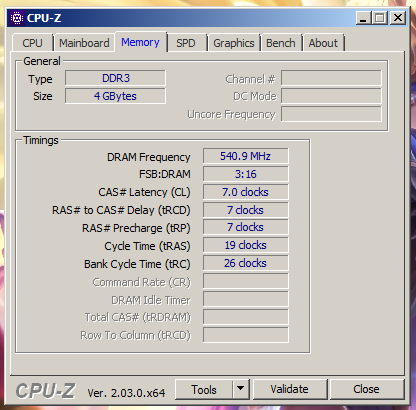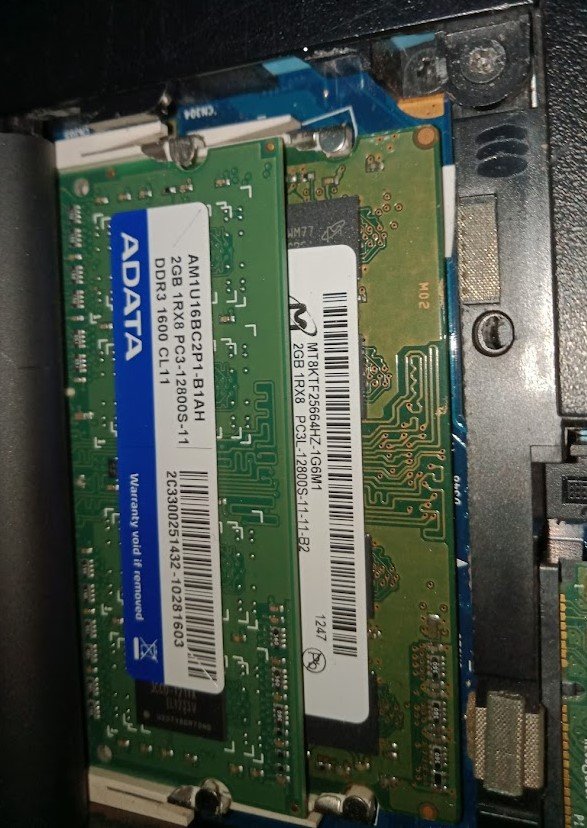Comparing: Seagate Momentus ST950032-5AS vs DDR3 SODIMM 1066MHz [Disk]
In this comparison, we analyze two Disks: Seagate Momentus ST950032-5AS and DDR3 SODIMM 1066MHz [Disk], using synthetic benchmark tests to evaluate their overall performance. This side-by-side comparison helps users understand which hardware delivers better value, speed, and efficiency based on standardized testing. Whether you're building a new system or upgrading an existing one, this benchmark-driven evaluation offers valuable insights to guide your decision.

Seagate Momentus ST950032-5AS
| Type: | Disks |
|---|---|
| Model: | Seagate ST950032-5AS |
| Capacity: | 500GB |
| Interface: | SATA-II 3Gbps |

DDR3 SODIMM 1066MHz [Disk]
| Type: | Disks |
|---|---|
| Model: | DDR3 SODIMM 1066MHz [Disk] |
| Capacity: | 2GB |
| Interface: | DDR3 |
Specification Comparison Table
This specification comparison presents technical details of several devices or components to help you understand the key differences between each option. Use this table as a reference to determine which device best suits your needs.
| Specification | Seagate Momentus ST950032-5AS | DDR3 SODIMM 1066MHz [Disk] |
|---|---|---|
| Brand | Seagate | - |
| Format | HDD 2.5 | RAM Disk |
| Capacity | 500GB | 2GB |
| Interface | SATA-II 3Gbps | DDR3 |
Submission Comparison Table
This submission comparison table displays the number and details of benchmark data submissions from various devices or components. This information helps you understand the performance based on the benchmarks that have been tested, as well as providing an overview of the consistency and popularity of the available benchmark results.
| No. | Benchmark Software | Seagate Momentus ST950032-5AS | DDR3 SODIMM 1066MHz [Disk] |
|---|---|---|---|
| 1 | ATTO Disk Benchmark - 64M |
Read: 67.46 MB/s Write: 69.85 MB/s |
Read: 1020.00 MB/s Write: 1080.00 MB/s |
| 2 | CrystalDiskMark |
Read: 58.09 MB/s Write: 62.91 MB/s |
Read: 746.24 MB/s Write: 828.18 MB/s |
Submission Comparison Chart
This chart visualizes the benchmark scores comparison between two hardware devices based on submitted data.
Media Gallery
A collection of photos of tested hardware. These images can help you identify the physical form, model, and variant of the hardware in question. These photos are from our own documentation, and if they are not available we may not be able to document them.
About Hardware Seagate Momentus ST950032-5AS
The Seagate ST9500325AS is a 500GB hard disk drive (HDD) with a 2.5-inch form factor, designed specifically for laptops, notebooks and portable devices. Utilizing a SATA II interface (3.0 Gbps) and a rotation speed of 5400 RPM, this hard drive offers a combination of low power consumption and sufficient performance for everyday computing needs, such as document storage, media, and light operating system installations.
Equipped with 8MB of buffer cache, the Seagate ST9500325AS is capable of handling basic read/write activities steadily, though not as fast as modern solid-state drives (SSDs). Nevertheless, it remains a popular choice for budget-conscious systems, secondary data storage, or upgrading storage capacity without high costs. Compared to 7200 RPM HDDs, 5400 RPM models like these also generate less heat and noise, making them suitable for laptops that prioritize comfort and power efficiency.
Technically, this HDD has an average seek time of about 12ms and is designed to support daily workloads with a high level of reliability. In our data transfer speed benchmark tests, the Seagate ST9500325AS performed as follows:
- Read Speed (Sequential Read): ~58 MB/s
- Write Speed (Sequential Write): ~62 MB/s
While its performance is far below that of SSDs, it is still relevant for basic use, especially on older systems or when large capacity is more important than speed. The Seagate ST9500325AS is also commonly found as built-in storage on previous generation laptops, and is still widely used for backups, large media file storage, and as a portable storage solution with external enclosures.
Device Test:
Device: Lenovo Sabine B475
CPU: AMD A6-3400M
GPU: IGP Radeon HD 6520G
RAM: 2GB DDR3
Thursday, 24 November 2022 09:14:30 | Update: 3 weeks ago
About Hardware DDR3 SODIMM 1066MHz [Disk]
DDR3 SODIMM 1066MHz is a third-generation memory module with a speed of 1066MHz that is commonly used in laptops and small devices. With the SODIMM form factor, these modules are often the standard choice for mobile computing systems, serving as the main memory for running operating systems, applications, and light to medium multitasking processes.
However, in this particular experiment, two 1066MHz DDR3 SODIMM modules from Micron and ADATA (2GB capacity each) were uniquely configured as a RAMDisk, a temporary storage space that uses RAM capacity to simulate a storage drive with much higher access speeds than SSDs or HDDs.
The 1066MHz DDR3 SODIMM-based RAMDisk test was conducted on an HP 1000 1b05au laptop device, powered by an AMD E1-1200 processor. The system is equipped with a 2x2GB DDR3 SODIMM 1600MHz RAM configuration, but due to processor architecture limitations, the memory only runs in single channel mode with an effective speed of 1066MHz. The operating system used is Windows 7, and to create and manage the RAMDisk, two popular applications, SoftPerfect RAMDisk and ImDisk Virtual Disk Driver, were used. The configured RAMDisk size was 2GB, utilizing some of the available RAM capacity.
Even though the device specifications are old and have limited memory bandwidth, the RAMDisk configured in this system was still able to show excellent performance in the read and write speed benchmarks. Based on tests using CrystalDiskMark, the read speed reached 746.24 MB/s, while the write speed touched 828.18 MB/s. In a follow-up test using ATTO Disk Benchmark with a 64MB block size, the read speed increased to 1020.00 MB/s, and the write speed reached 1080.00 MB/s. These results prove that even on older systems, RAMDisk configurations are still capable of delivering very high I/O performance, far surpassing conventional storage such as HDDs or even some SSDs.
Analysis
The results show that a 1066MHz DDR3-based RAMDisk is still capable of delivering data transfer speeds on par with entry-level NVMe SSDs, even outperforming many SATA SSDs and leaving conventional HDDs far behind. This makes RAMDisks an ideal solution for temporary use such as:
- Application caching,
- Temporary file storage,
- Fast computing with high I/O,
- Software or script testing without the risk of contaminating the main file system.
Although limited to a small capacity (2GB in this test), RAMDisk is still very useful for specific needs, especially for users with more than enough RAM or older devices that want to maximize their performance.
Test on:
Device: HP 1000 1b05au
Specs:
CPU: AMD E1-1200
OS: Windows 7
RAM: 2x2GB Single Channel 2 DIMM 1066MHz (Does not support dual channel due to limitations of the CPU, currently running single channel mode and 1066MHz)
Wednesday, 26 December 2012 14:27:32 | Update: 2 weeks ago


